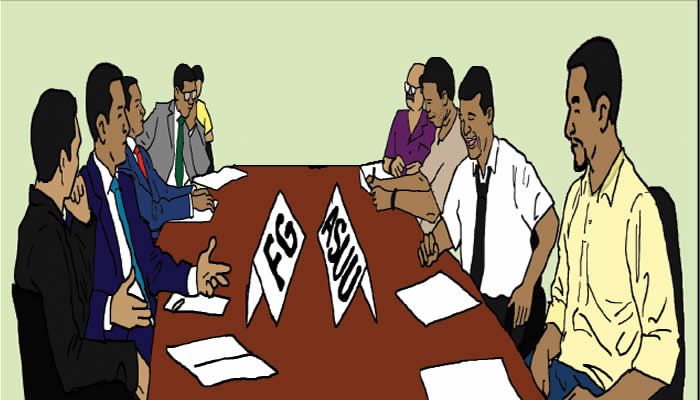
The Federal Government has threatened to sue the striking lecturers, who are members of the Academic Staff Union of Universities if they fail to resume as ruled by the National Industrial Court.
The Minister of Labour and Employment, Dr Chris Ngige, who issued this threat on Friday during an interview monitored on Channel TV, disclosed that he had directed labour controllers to monitor compliance at all tertiary institutions across the states.
He said, “The court says ASUU must obey today (Friday). I have asked labour controllers in the 36 states and the zones to reach out to the universities; number one, to see if the vice chancellors have opened the gates because that is one of the imports of the judgment of the Industrial Court.
“You must open the gates, you must open the class rooms and to see whether those workers, those teachers reported today, tomorrow Friday and Saturday. My labour controllers will write me a report.
“The Education Ministry through the NUC will also do their bit and we will compare it. By Tuesday, if they have complied with this, first, they will have the right to appeal as the court says.
“If they come back to their classroom, they will have time to attach evidence and do their appeal. My labour controllers will also give me things to support education in the country. If they don’t, go and read that portion of the NICN Act, they will be charged for contempt,” he said.
Meanwhile, the ASUU has said it will study the ruling of the appeal court which ordered its members to return back to work.
The union’s national president, Professor Emmanuel Osodeke reacted on behalf of the union.
Saturday PUNCH reports that the Court of Appeal in Abuja, on Friday, ordered the Academic Staff Union of Universities to call off its strike.
The court gave the order after dismissing the union’s application for a stay of execution of an earlier ruling of the National Industrial Court directing the university lecturers to resume work.
The three-member panel of the Court of Appeal led by Hamma Barka granted the union permission to appeal the ruling of the industrial court but ruled that it must first resume work to be allowed to file the appeal.
It said should ASUU fail to re-open the universities, the permission it gave the union to appeal against the interlocutory injunction of the National Industrial Court “will be automatically vacated.”
It gave the university lecturers’ union seven days within which to file its notice of appeal against the order of the National Industrial Court.
“I am inclined to grant the application to appeal the decision of the National Industrial Court of Nigeria. But the order of the lower court shall be immediately obeyed,” the court held in its unanimous ruling.
But reacting to the court order, Osodeke said, “We will review the judgment with our lawyer and we will decide on the next step.”
The National Industrial Court had on 21 September ordered ASUU to call off the strike.
The court granted the motion on notice filed by the federal government, directing the lecturers to return to classrooms.
Ruling on the interlocutory injunction, the trial judge, Polycarp Hamman, restrained ASUU from continuing with the industrial action pending the determination of the suit filed against ASUU by the federal government.
Displeased by the ruling, the union headed to the appeal court to appeal the ruling.
It also filed a stay of execution of the ruling of the industrial court.
But the Court of Appeal ordered the striking lecturers to “immediately” call off the eight-month strike, having struck out ASUU’s application for a stay of execution of the lower court’s order.
It said it was within ASUU’s right to appeal the decision of the industrial court.
Agreeing with the Federal Government’s argument that ASUU cannot approach the appellate court with “dirty hands”, the panel held, “should the applicant fail to obey the order (of the lower court), the leave granted shall be automatically vacated.”














